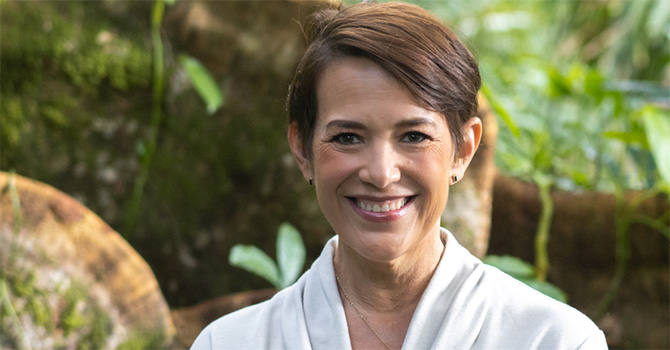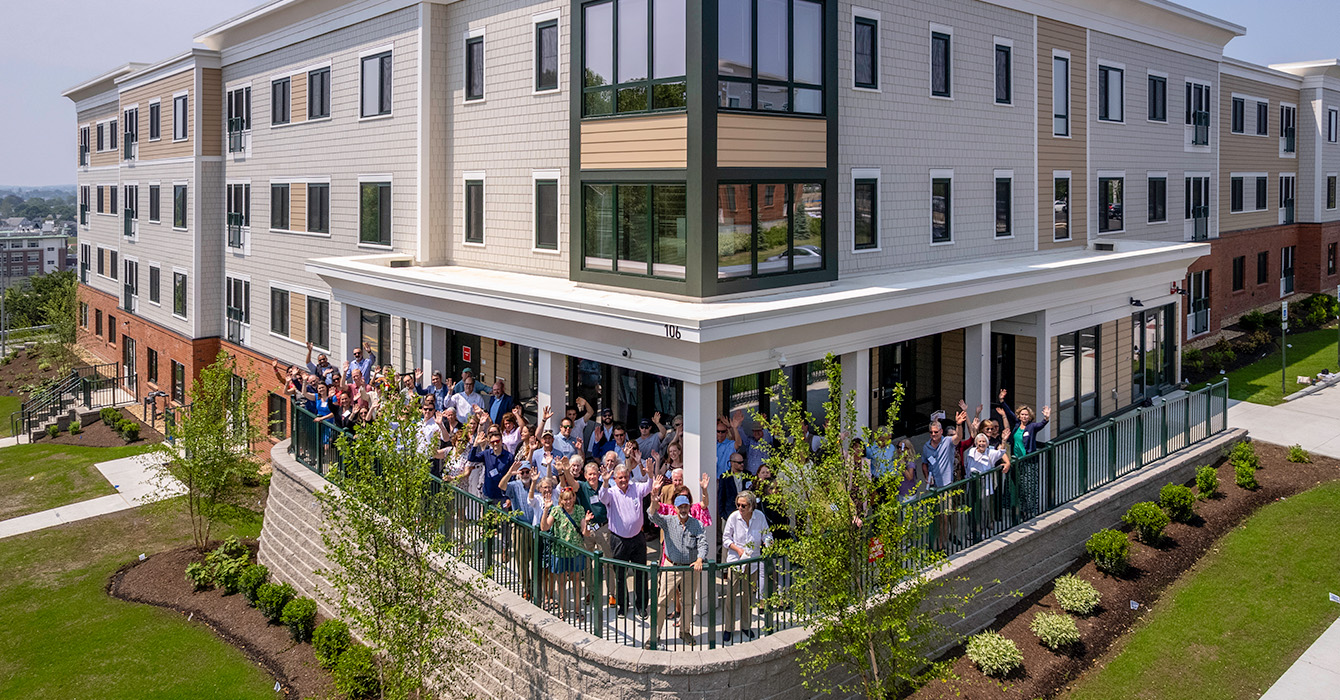For years, Ken and Beverly Jenkins had driven by the vacant strip mall anchored by a grocery store in the St. Louis suburb of Dellwood, Missouri. The married pastors saw potential.
Why not turn the empty mall into something more, something that could help people reach their potential?
In fall 2023, they fulfilled their dream by opening a $20 million, nearly 90,000-square-foot development called R&R Marketplace.
It’s where people can get career and leadership training, open an office or host a meeting in a coworking space, and drop off their child at a day care. They can get help with substance use disorders, take out a bank loan and pick up a prescription. And on the way out, they can grab an order of wings or shrimp from a restaurant called Cathy’s Kitchen.
“From the big picture, it’s about how we can love people well and walk with people and see people’s lives changed and transformed,” Ken Jenkins said. “We do that with everybody. If you come in right now, and you are a single mom crying at the door, we’re gonna love you. If you’re the president and you walk in here, we’re gonna love you. It doesn’t matter. We don’t care. We don’t check names and income and stuff. You step on this lot, we say it’s holy ground.”
A discussion on race
The marketplace is less than two miles from the spot where Michael Brown was shot and killed by a Ferguson police officer in August 2014, sparking protests in the U.S. and around the world. Dellwood, a mostly Black working-class community, is surrounded on three sides by the suburb of Ferguson, which became a household name and a hashtag in an international discussion about race.
While many people there are devoted to the community, like the Jenkinses they were frustrated by the lack of resources and disinvestment. There are more than two dozen predatory lending businesses within a 5-mile radius of the marketplace, the couple pointed out. People drive to wealthier communities for organic foods. Many big businesses overlook the area entirely.
Beverly Jenkins recalled the words of her grandmother and her father, who was a firefighter. “They always said that you see your neighbor's house on fire, and you won’t grab a bucket, eventually you’re going to burn your own house down too. So, it’s the same thing with serving and investing in community.”

The Jenkinses have been serving the area for years as pastors of a nondenominational church called Refuge and Restoration (the R&R in the project’s name). They raised four children, put down roots and made connections. For about 20 years they managed a career-training program called Jobs for Life, helping more than 3,000 people move into more meaningful and stable careers.
As they eyed the strip mall, they knew their dream of expanding their program, and serving additional people in different ways, would take more expertise and money. Ken Jenkins had a career in corporate recruiting, and Beverly Jenkins worked primarily in ministry.
After Brown’s death, the couple was asked to lead Bible study groups of predominantly white executives to talk about race. Those discussions led to friendships and more connections.
“Ferguson was a catalyst for a lot of people with questions,” Beverly Jenkins said. “So, if you had an answer, then people were like, oh, finally, we can solve some things.”
As the Jenkinses shared their dream for the vacant strip mall, they were able to secure enough donations and investments to buy the center and start building. Midwest BankCentre loaned them $5.75 million and opened a branch in the marketplace.
What are financial and non-financial ways to invest in your community?

“When [supporters] heard our solution, they understood the solution is not coming from outside entities,” Beverly Jenkins said. “The solution is not coming from academics. The solution is coming from insiders, with the people. The people are saying, ‘Hey, this is what we want.’”
Building a kingdom
Five pillars support the project’s structure: early childhood education; workforce development; small business development; banking; and the multiplex that includes the church and resources such as a theater, a venue space and a commercial demonstration kitchen.
The theater and church portions of the complex are expected to be completed later this year.
The renovated space is appealing. Cool blue tiles make up a backsplash in a kitchen reception area of the North County Innovation Center, a coworking space that includes a podcast studio, meeting spaces, individual offices and a workout room. Modular furniture caters to different group sizes and needs. People can rent the spaces for longer terms or by the hour, which helps to bring in revenue.

Darius Williams, the director of the innovation center, makes it clear that their work is more than offering a nice space.
“We want to make sure that when you come and you get an office, that you have access to the resources equitably to begin to grow,” he said.
The NCIC offers connections to coaching, digital marketing and financial services. Motivation Mondays and Thrive Thursdays are opportunities to connect, learn, network and maybe get a headshot or a massage. Praxis Redemptive Labs help people look at strategy and business building through a faith-based, redemptive lens.
Williams noted that Christian faith leaders started universities and hospitals in America because of their desire to serve others and that Jesus took the position of a servant when he washed his disciples’ feet.
“If that doesn’t tell you what it means to actually live as a Christian leader, I don’t know what other story can,” he said. “The thing we try to do across the marketplace, but especially at NCIC, is we want to radically serve people.”
Who are the local insiders who can help address challenges?
Life Creative STL, a group of artists focused on financial wellness and creative leadership, meets regularly at NCIC, because they wanted to support the community but didn’t need their own brick-and-mortar space.
“I love the environment here,” said Brian Owens, the group’s founder. “I love the culture here. Everybody’s welcoming, hospitable, and for me it’s allowed us to dive in even deeper, to have a strong structure, to be able to be in person.”
Kela Woods, a licensed professional counselor, rents an office. Her 2-year-old son, Kanaan, attends the marketplace’s day care just a few doors down, called Brilliant Angels Academy. She loves the convenience of the day care, and her son loves playing and learning there.

Her clients have a large waiting area, and Woods connects with others who use and rent the space. She completed the Praxis development program and refers clients to the other services available at the marketplace.
She’s in a better position to help people in the community.
“If you type in the ZIP code and look for a therapist, not many pop up,” Woods said. “So, it does feel good to be here, to get a call from a client and they say, ‘oh, you’re five minutes from me.’”
Dr. Andwele Jolly is the president and CEO of the St. Louis Integrated Health Network, a health care intermediary for safety net health care providers in the region who work together for equitable access to health care. The group recently held its first board meeting at NCIC.
“When I define health, I define it broadly, in terms of feeding everyone's needs — food and nutrition, physical activity, social well-being,” he said. “And part of that social fabric is having a strong and vibrant faith community to support you on that journey.”
The Jenkinses are helping to build that ecosystem, and he wants to support it, Jolly said. “You can be very creative without a lot. It begins with relationships. And once you see something pure like this, you don’t have to say a lot. It just happens.”
Providing more support
The area’s first nonprofit community pharmacy and a treatment clinic, Rx Outreach and Assisted Recovery Centers of America, also have spaces at the marketplace, offering free or low-cost, accessible options.
“Usually, people in communities do not want mental health facilities or anything to do with addiction recovery,” Ken Jenkins said. “Normally, the culture is that you have people out front, sort of loitering, smoking, hanging. One of the things we talked about is that we can’t have that here, because of our mission, and we’re doing an early childhood center.”
The recovery center has seen more than 1,000 people since opening about six months ago, and the marketplace hasn’t had any issues. People discreetly use the facility, getting the help they need, he said.
Rx Outreach’s pharmacist, Dr. Jordyn Nordé, grew up in the area and worked with underserved populations in previous jobs. She loves being able to serve patients from ARCA and to help those from the broader community who appreciate the convenience and friendly service.
What does it look like to radically serve the people in your neighborhood?
“God put us here to be able to help and serve others,” she said. “That was the big selling point for me with Rx Outreach. When I’m thinking about the mark I want to leave, it’s definitely to be able to be a servant, to be able to help people who have seen me grow up and want to see me succeed — and then I want to see succeed.”
Coaching for jobs and entrepreneurship
Employ St. Louis, which offers career development and other training, also has a large classroom space and offices at R&R Marketplace. In 2024, more than 600 people received some sort of training, Employ St. Louis director Shonda Gray said.
During its free career development coaching program, people of all ages and backgrounds meet twice a week for six weeks to learn from executive coaches and each other. The faith-based program helps people set achievable career goals and learn exactly what they’re capable of achieving.
One graduate has taken a job as a certified peer specialist for the drug treatment center next door, and Employ St. Louis is talking to the treatment center to provide career development programming for their veterans.
Lovie Johnson had worked in housekeeping at a hospital and was settling into retirement when Gray encouraged her to sign up. At first, Johnson was overwhelmed by the classes and materials, but she wound up doing something she had not expected: start her own business, called Lovie Cleaning Services.
Now, with the help of two teenage grandchildren she employs, she cleans the offices of NCIC and other outside clients. She loves setting her own hours and giving back in her own way.
“When you have a place of business, you want to walk into a clean environment,” she said. “That makes your whole day a bit different, right?”

Ken Jenkins’ sister, Elizabeth Harvey, signed up for the program after retiring early from a government job. She has learned how to turn her passion for blending herbal teas into an online business, Blessings by the Cupful.
“It was so great for me, because what it really did was give me a lot of encouragement and see that I can really do this,” she said. “You really got to know yourself, to see what your roadblocks were and how you were your biggest enemy.”
Harvey has since taken other workshops at the marketplace and set up a virtual mailbox there. She opened a business account at its bank branch. And later this year, after the commercial kitchen space is built, she hopes to use it to mix her tea blends.
How does your community support emerging leaders who have grown up among you?
“It’s so neat because there’s always somebody up there who has some kind of skill set that you’re looking for,” she said.
‘A masterful painter’
The marketplace has elevated the expectations of the community, the Jenkinses say.
“Even with our donors and partners, they come into the facility, our friends, they say, ‘We didn’t expect it was going to be like this,’” Ken Jenkins said.
But, the Jenkinses say, why shouldn’t the people here deserve it?
“When you’re in a community and you’ve only seen brokenness, when you bring something into a community and you set it as a light on the hill, that’s God,” Beverly Jenkins said. “This is really His space. He’s such a masterful painter.”
Now, people are coming from other places in the St. Louis area to use the space. The day care center has a waiting list. Donors see results and are more inclined to invest.
The Jenkinses have known all along that theirs is not the unrecognizable community people saw during the protests following Brown’s shooting.
Watching the news and seeing people around the world standing in solidarity was beautiful, they said, but they knew the people here were already grounded in community.
They just need others to believe in them and see their potential too.
“This model disrupted the thinking and changed the narrative,” Ken Jenkins said. “Beverly and I? We’re regular people. It’s you believing in the community and taking a step of faith and believing that things are possible.”
How can you cultivate spaces for people with different talents and skill sets to meet and collaborate?

Questions to consider
- What are financial and non-financial ways to invest in your community?
- Who are the local insiders who can help address challenges?
- What does it look like to radically serve the people in your neighborhood?
- How does your community support emerging leaders who have grown up among you?
- How can you cultivate spaces for people with different talents and skill sets to meet and collaborate?



















